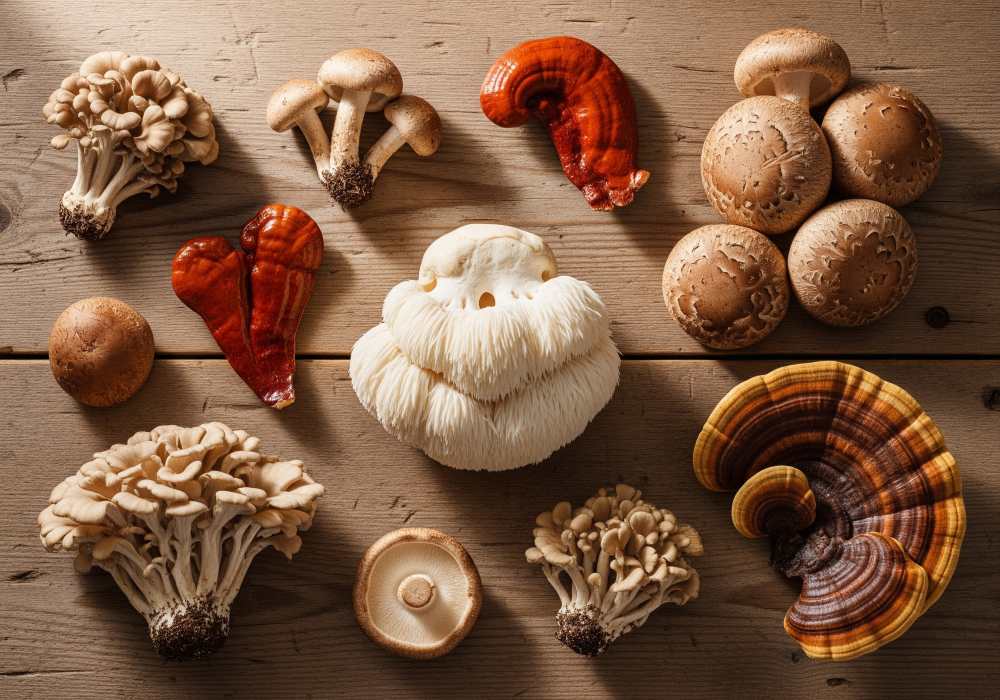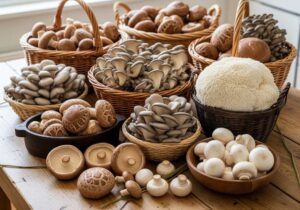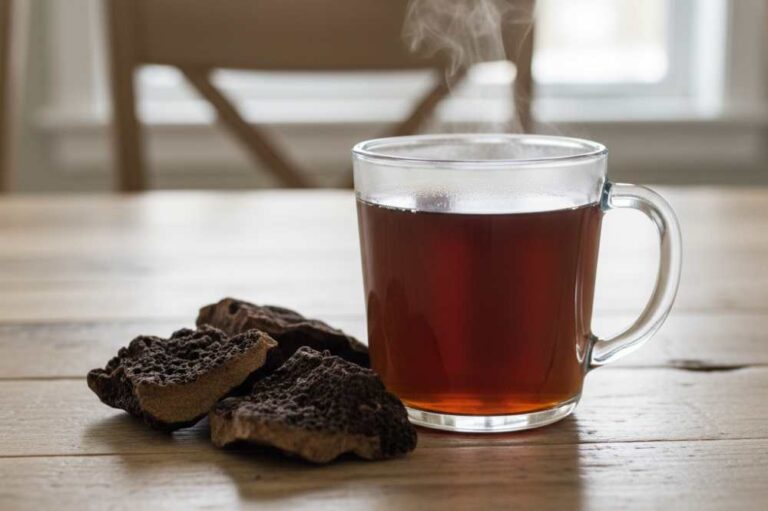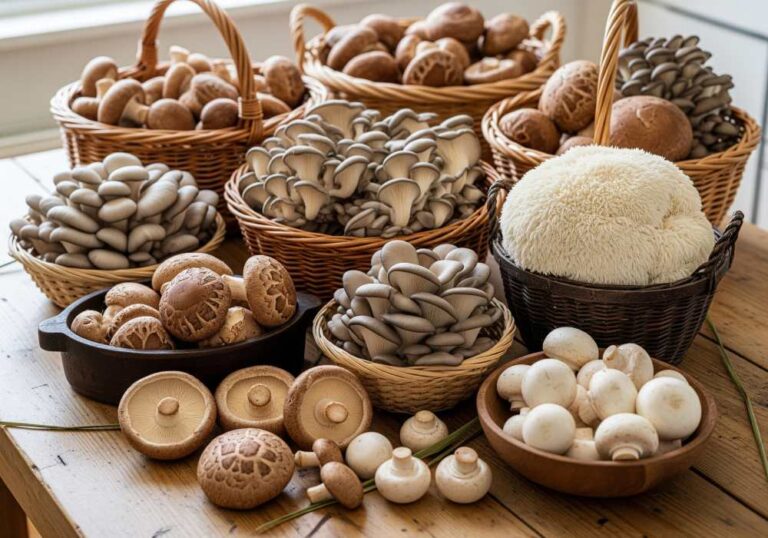Not long ago, mushrooms were seen as something you toss on a pizza or sauté with garlic. But today, they’re being dissected in medical journals, tested in clinical trials, and increasingly marketed as everything from brain boosters to immune defenders.
We’re now in an era where people want more than just calories from food. We’re seeking ingredients that do something: improve focus, regulate immunity, support our gut, and protect our heart. Mushrooms, especially functional ones, are answering that call.
But with the explosion of mushroom products—extracts, powders, capsules—it’s easy to get overwhelmed. Not all mushrooms are created equal, and not all have the same clinical backing. That’s why this article exists. We’ve dug into the actual research, cross-referenced human trials, analyzed the pharmacologically active compounds, and ranked the healthiest mushrooms based on real evidence, not just marketing fluff.
How The Mushrooms are Ranked
This isn’t one of those blog posts where we pick top mushrooms based on vibes or Google Trends. The rankings here are drawn directly from a combination of peer-reviewed studies, mechanistic research, and known pharmacological effects. Specifically, we used the following criteria to evaluate each mushroom:
- Presence of clinically relevant bioactive compounds – Think polysaccharide-K, β-glucans, hericenones, ergothioneine, and more. These aren’t just chemical buzzwords—they’re compounds with demonstrated biological impact in humans and animals alike.
- Evidence from human or in vivo studies – A mushroom showing promise in a petri dish is interesting. Still, it doesn’t cut unless we’ve seen results in real physiology (via rodent models or clinical trials).
- Impact on major health areas – We’re looking at how each mushroom affects systems that matter most: cognitive function, immunity, cardiovascular health, metabolic regulation, inflammation, and oxidative stress.
- Availability and safety for regular use – Some exotic or wild mushrooms might have unique properties, but if they’re not widely available or pose toxicity risks, they weren’t ranked. This list focuses on edible or supplement-form mushrooms you can safely use long-term.
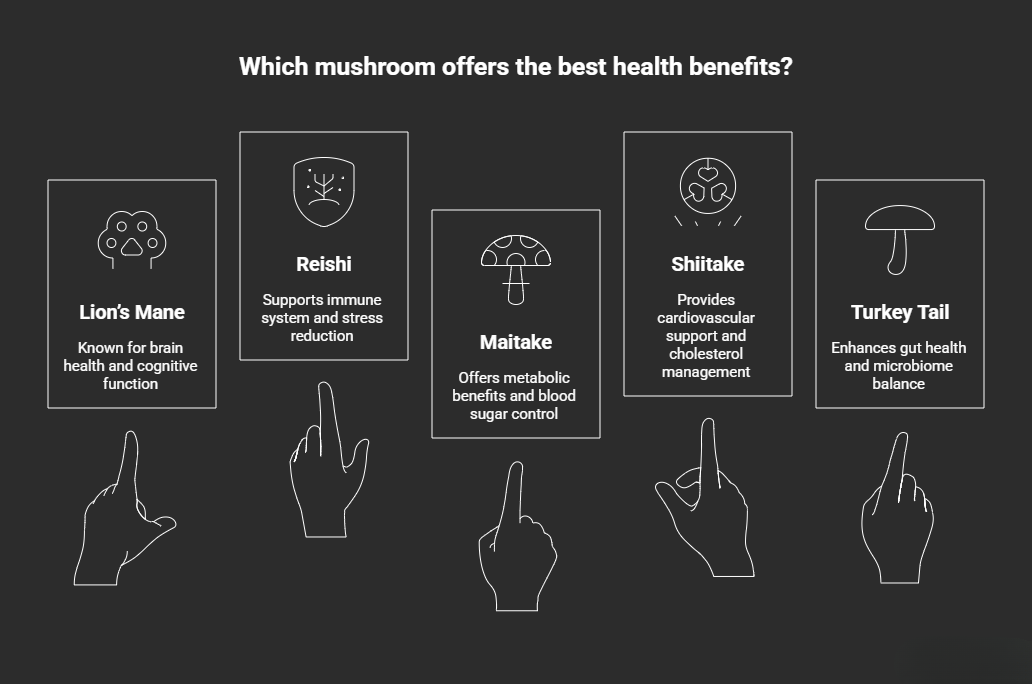
I’ve also consulted several systematic reviews and meta-analyses1 2 to ensure consistency and scientific relevance.
Lion’s Mane– The Brain’s Best Friend
If I could only take one mushroom supplement for the rest of my life, it would be Lion’s Mane—and I say that as someone who’s tried them all. This isn’t hype. It’s science-backed. Lion’s Mane has repeatedly shown effects that are, quite frankly, astonishing when you compare them to most other natural compounds.
Lion’s Mane contains hericenones and erinacines, which are rare in the natural world. These compounds stimulate the production of nerve growth factor (NGF)—a protein essential for neurons’ growth, maintenance, and survival. This makes it one of the few natural substances with neuroregenerative potential. In simpler terms, it doesn’t just protect your brain—it helps rebuild it.
According to studies have demonstrated Lion’s Mane’s ability to improve cognitive performance in individuals with mild cognitive impairment. Another clinical study from Frontiers in Nutrition3 highlighted its anti-neuroinflammatory effects, particularly in aging populations, suggesting potential use in conditions like Alzheimer’s or age-related memory loss.
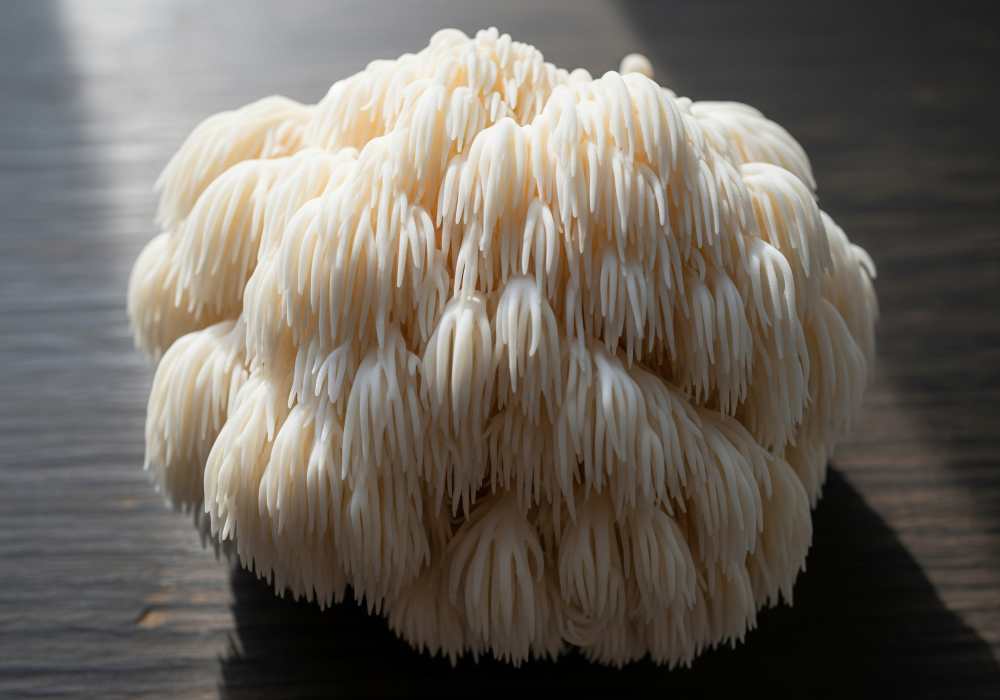
I personally noticed its effects after just a few weeks—clearer thoughts, better memory retention, and less of that afternoon fog. And that’s consistent with anecdotal reports from functional medicine practitioners and nootropic enthusiasts.
Beyond brain health, Lion’s Mane has also shown promise in:
- Reducing depression and anxiety via modulation of BDNF (brain-derived neurotrophic factor)
- Supporting nerve repair in peripheral injuries
- Enhancing gut-brain axis communication through its prebiotic effects
And while most mushrooms work best in their whole-food form, Lion’s Mane is one I recommend supplementing in dual-extract form—hot water and alcohol extracts. You get both the polysaccharides and the lipophilic neuroactives.
Whether you’re looking to protect your mind as you age or just want to sharpen your daily focus, Lion’s Mane earns its top spot for a reason.
Reishi – The Immune Modulator
If Lion’s Mane is the mushroom for your brain, Reishi is the one for your immune system—and frankly, your whole nervous system too. Known as the “Mushroom of Immortality” in Traditional Chinese Medicine, Reishi has been used for thousands of years, but modern research is finally catching up with its reputation.
Reishi contains triterpenes, ganoderic acids, and high-molecular-weight polysaccharides, all of which play key roles in immunomodulation, meaning they help regulate the immune system, not just stimulate it blindly. This is a critical distinction. It helps bring an overactive or underperforming immune system back into balance.

Clinical studies4 have shown that Reishi enhances natural killer (NK) cell activity, increases T-cell proliferation, and supports cytokine balance, making it particularly useful in:
- Chronic infections or viral recovery
- Allergy modulation (by balancing Th1/Th2 immune response)
- Autoimmune-adjacent conditions where immune overactivity needs tempering
But that’s not all. Reishi has adaptogenic effects—it helps the body manage physical and mental stress. Some compounds in Reishi interact with the hypothalamic-pituitary-adrenal (HPA) axis, helping reduce cortisol levels and improving sleep quality. I’ve used it in my evening routine during high-stress periods, and it’s one of the few natural ingredients that noticeably takes the edge off.
There’s also growing research on its potential role in oncology as a supportive therapy. While not a replacement for conventional treatment, Reishi extracts have been used to reduce chemotherapy side effects and improve quality of life in cancer patients, thanks to their immune-balancing and anti-inflammatory properties.
If you’re looking for a mushroom that doesn’t just support immunity but supports you—your energy, resilience, and recovery—Reishi belongs in your rotation.
Shiitake – The Cardiovascular Guardian
Shiitake might be the only mushroom on this list that’s as familiar in a stir-fry as it is in a lab study. Behind its rich flavor is a powerhouse of cardiovascular benefits, and unlike many medicinal mushrooms, this one has both culinary and clinical credibility.
Shiitake’s most significant compound is eritadenine, a molecule known for its cholesterol-lowering properties. It works by suppressing the activity of S-adenosylhomocysteine hydrolase, which influences lipid metabolism and helps reduce serum LDL cholesterol.
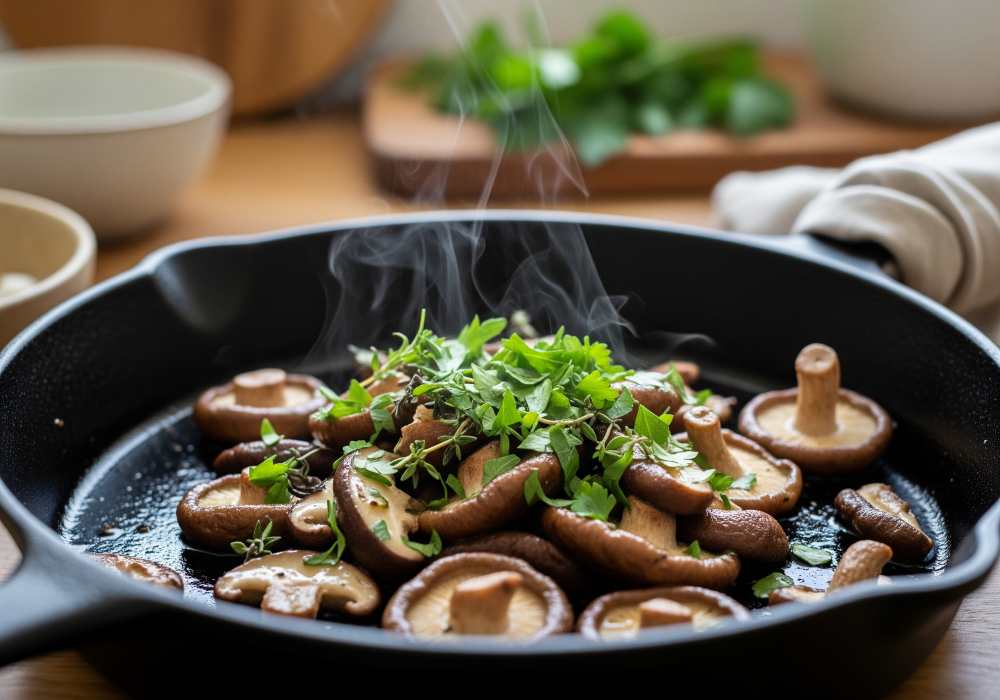
A recent study5 confirmed Shiitake’s effectiveness in improving lipid profiles and reducing atherosclerotic risk in animal models.
Another key element is lentinan, a polysaccharide with notable immune-enhancing and anti-tumor properties. While more commonly studied in the context of cancer support, lentinan also contributes to general immune resilience and has antimicrobial effects, particularly against oral pathogens.
What sets Shiitake apart, though, is how easily it fits into everyday diets. You don’t need a capsule or tincture. Just cook it. The bioactive compounds are heat-stable, and you still benefit even when it’s sautéed, roasted, or stewed.
Shiitake mushrooms are ideal for heart health, immune support, and versatility in the kitchen. I recommend them most to people who want food as medicine without having to take supplements.
Maitake– The Metabolic Regulator
If your concerns lie more with blood sugar, insulin resistance, or metabolic slowdown, Maitake should be your go-to. This frilly, fan-like mushroom might look delicate, but its impact on glucose regulation is anything but soft.
Maitake is rich in D-fraction and SX-fraction, two protein-bound polysaccharides shown to enhance insulin sensitivity and improve glycemic control. According to a study from International Journal of Microbiology, Maitake extracts have been observed to lower blood glucose in both diabetic mice and human subjects. It’s a valuable natural ally for those managing type 2 diabetes or metabolic syndrome.
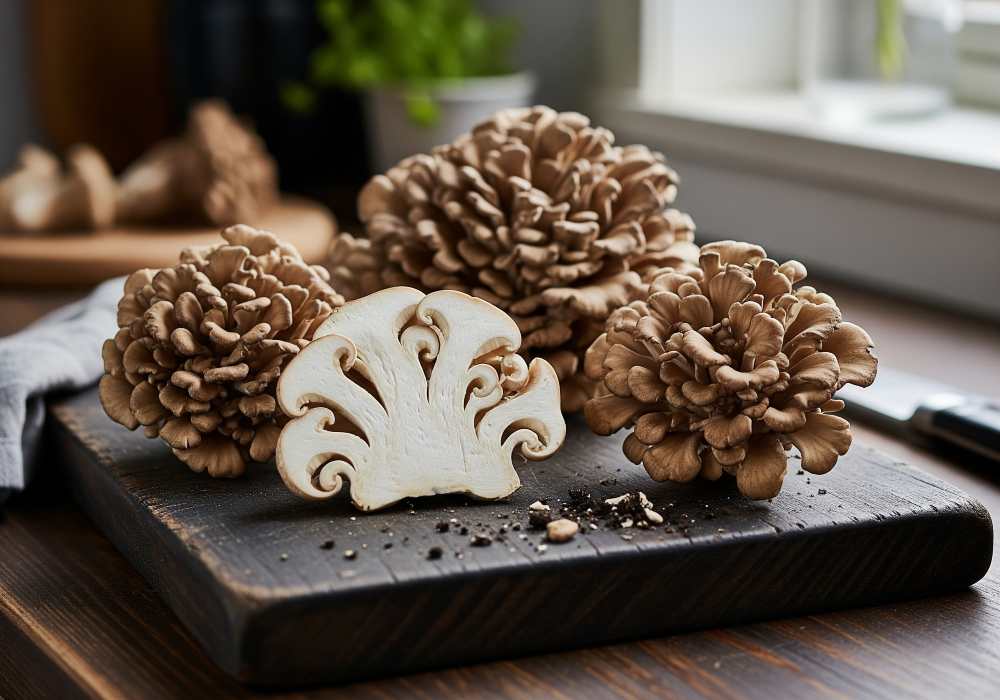
From a mechanistic point of view, Maitake seems to increase glucose uptake in peripheral tissues and modulate the function of insulin receptors, leading to more efficient glucose metabolism. This makes it especially interesting for those dealing with polycystic ovary syndrome (PCOS) or other conditions of insulin resistance.
But its benefits go beyond blood sugar. Maitake also supports:
- Fat metabolism and potentially body weight regulation
- Immune stimulation, particularly increasing macrophage activity
- Mild antihypertensive effects through vascular tone modulation
From my personal use, Maitake is best consumed as a cooked mushroom for mild benefits, or taken in fractionated extract form if you’re targeting blood sugar specifically. It’s one of the few mushrooms I’ve seen clients respond to visibly, especially regarding energy stability and mid-day crashes.
Turkey Tail – The Gut and Immunity Ally
Turkey Tail is one of those mushrooms that rarely gets culinary praise—it’s too tough, too woody—but it’s easily one of the most well-researched fungi in the world of clinical immunology. And if you care about your gut or immune resilience, it’s a top-tier contender.

Its real power lies in its polysaccharide-K (PSK) and polysaccharopeptide (PSP) content—two compounds that have been widely studied in Japan and China for their role in cancer adjunct therapy. Both have been shown to enhance immune surveillance, improve T-cell function, and slow tumor progression in certain contexts. Studies from J Nutr Biochem and Adv. Nutr give weight to its status as a myco-immunotherapeutic agent.
But what fascinates me most is its impact on the gut microbiota. PSK functions almost like a prebiotic fiber, selectively feeding beneficial gut bacteria, particularly strains like Bifidobacteria and Lactobacilli. A healthier gut microbiome means better systemic immunity, more efficient nutrient absorption, and even improved mood regulation.
While you can’t exactly stir-fry Turkey Tail, it’s widely available as a hot water extract or in capsule form, and I always keep some on hand during the colder months. It’s also one of the safest mushrooms on this list—non-toxic, non-stimulating, but quietly powerful in ways that go beyond just “boosting immunity.”
Final Takeaway
Ultimately, the healthiest mushrooms aren’t just about what disease they can fight but about what kind of vitality they can support. So whether you’re aiming to think sharper, move better, or simply live with more resilience, fungi aren’t fringe anymore—they’re foundational.
And the smartest move you can make? Start using them intentionally. Choose the ones that align with your needs. Use them consistently.
Resources:
- Blumfield, M., Abbott, K., Duve, E., Cassettari, T., Marshall, S., & Fayet-Moore, F. (2020). Examining the health effects and bioactive components in Agaricus bisporus mushrooms: a scoping review. The Journal of Nutritional Biochemistry, 84, 108453. https://doi.org/10.1016/j.jnutbio.2020.108453 ↩︎
- Ba, D. M., Ssentongo, P., Beelman, R. B., Muscat, J., Gao, X., & Richie, J. P. (2021). Higher Mushroom Consumption Is Associated with Lower Risk of Cancer: A Systematic Review and Meta-Analysis of Observational Studies. Advances in Nutrition, 12(5), 1691–1704. https://doi.org/10.1093/advances/nmab015 ↩︎
- Bell, V., Silva, C. R. P. G., Guina, J., & Fernandes, T. H. (2022). Mushrooms as future generation healthy foods. Frontiers in Nutrition, 9. https://doi.org/10.3389/fnut.2022.1050099 ↩︎
- Assemie, A., & Abaya, G. (2022). The effect of edible mushroom on health and their biochemistry. International Journal of Microbiology, 2022, 1–7. https://doi.org/10.1155/2022/8744788 ↩︎
- Singh, A., Saini, R. K., Kumar, A., Chawla, P., & Kaushik, R. (2025). Mushrooms as Nutritional Powerhouses: A Review of Their Bioactive Compounds, Health Benefits, and Value-Added Products. Foods, 14(5), 741. https://doi.org/10.3390/foods14050741 ↩︎

